Thanks for your support! If you make a purchase using our links in this article, we may make a commission. And, as an Amazon Associate, I earn from qualifying purchases. See the full disclosure here.
Updated Feb 9, 2024
Deciding whether to go with a single axle or double axle camper trailer is one of the most important decisions you’ll make when choosing a travel trailer. Both single axle and dual axle camper trailers have pros and cons, and it’s tough to decide which version is best for you.
In this discussion, we explore the key differences between single and double-axle camper trailers so that you can make an informed decision.
We also consider factors such as price, weight, maneuverability, and off-road capability to choose the right option for your needs. You’ll also learn tips on selecting the most suitable axle configuration for your RV needs.
But before we go into the pros and cons of single and double axle camper trailers, let’s discuss the function of an RV axle to help you better understand its role and how it works.
What’s the Function of an RV Axle?
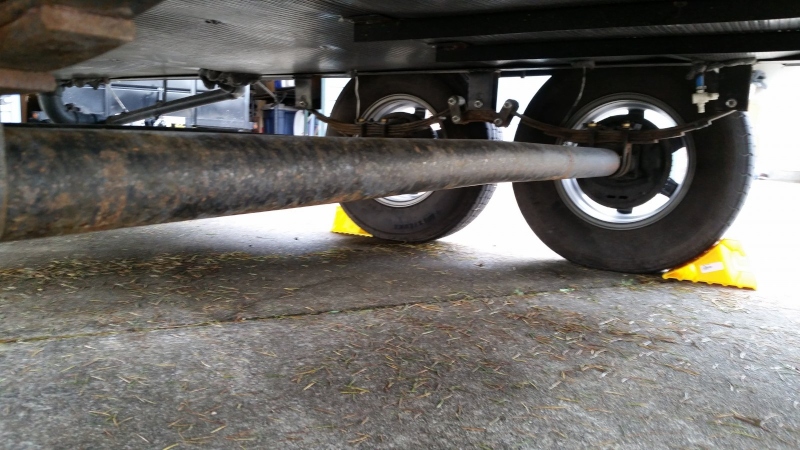
An RV axle serves an essential function in the suspension system of a camper trailer. This component helps to support and stabilize the entire rig, distributing weight evenly across a single or double axle.
In addition, an RV axle plays a vital role in helping to control movement, ensuring that the vehicle is stable and maneuverable. Whether you are driving on winding back roads or navigating tight campsite parking spaces, this vital piece of equipment helps ensure that your camper trailer stays safely on the ground.
RV Suspension Systems
Two main RV axle suspension systems work with your axles: leaf spring and torsion.
A leaf spring suspension is ideal for larger, heavier travel trailers, as it can easily support up to 7,000 lbs of weight. In addition, the springs lift the travel trailer higher off the ground, giving the trailer a bit more clearance when driving over uneven terrain.
In contrast, a torsion axle is better suited for smaller or lighter campers, as it provides a smoother and more comfortable ride while holding up to 4,000 lbs. Inside the axle is a rubber compound that acts as a spring and shock absorber.
The leaf spring dates back to the 1800s for horse and wagon suspension. Europe and Detroit used early torsion bar suspension technology in the 1930s and 1940s in cars and military equipment, but Airstream perfected it for RVs in 1961.
But which type of axle is best for your trailer?
Let’s look at some of the key differences between single and double-axle camper trailers so you can make an informed decision.
Do Single Axle Trailers Have Brakes?
Safety is always a top priority when hauling heavy loads, especially using single-axle trailers.
Single-axle trailers are lightweight and easy to maneuver. However, a common concern among trailer owners is if their single-axle trailer has brakes.
The answer? It depends.
Single-axle trailers do not come with brakes as standard equipment. However, there are certain situations where brakes may be necessary or even required by law.
First, let’s clarify what we mean by “brakes.”
In this context, we are talking about electric brakes—also known as “electric trailer brakes” or EBS.
EBS brakes use electricity to slow down or stop the trailer rather than relying on the tow vehicle’s brakes.
Under federal regulations from the Department of Transportation (DOT), any trailer with a gross weight rating of over 3,000 pounds must have an independent braking system.
If the gross weight rating of your single-axle trailer is less than 3,000 pounds, it is not required to have a braking system.
However, there are exceptions to this rule.
Some states may require trailers with lower gross weight ratings to have brakes in certain situations.
For example, California requires trailers with a gross weight rating of over 1,500 pounds to have brakes if towed at speeds over 20 miles per hour.
While the law does not require all single-axle trailers to have brakes, safety experts strongly recommend it.
Whether to equip your trailer with brakes should depend on the weight of the trailer, the speeds at which you will travel, and the laws in your area.
12 Pros and Cons of Single Axle vs Dual Axle Travel Trailers

Each has its own advantages and disadvantages with single or double axle camper trailers. If you’re considering a travel trailer, it’s important to weigh the pros and cons of both axle setups to decide which one is right for you.
We’ll go through each factor you should consider and show you which type of axle is best based on the unique features.
1. Braking Performance – Double Axle
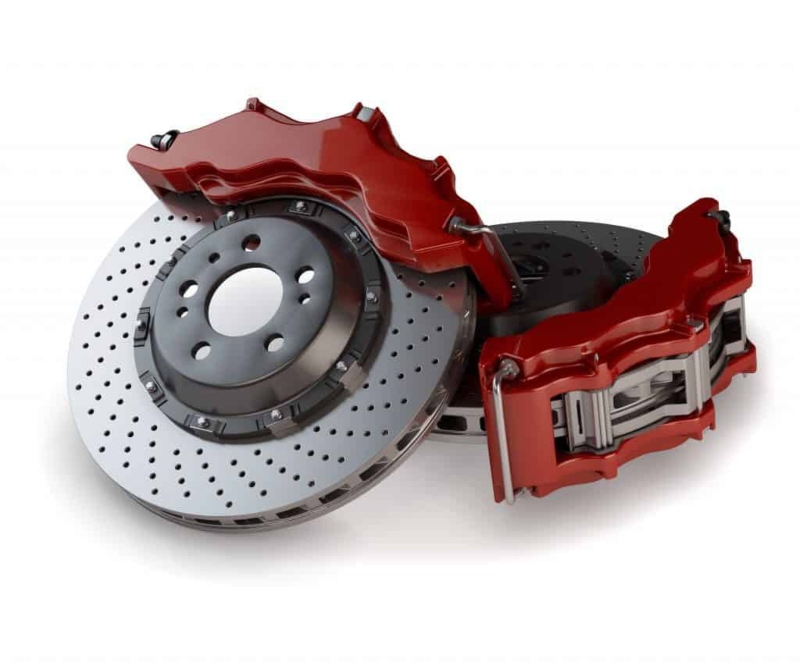
One of any RV’s most important safety features is the braking system. Trailer brakes required for towable trailers differ state by state, but today virtually every RV manufacturer adds electronic brakes on their coaches.
While all trailer brakes provide superior stopping power, double axle trailer brakes offer several advantages over their single-axle counterparts.
Foremost, double axle brakes allow the trailer to stop quickly and safely. With four wheels braking instead of two, tandem axle travel trailers can disperse the force of the brake, which results in shorter stopping distances.
Double axle trailer brakes also provide greater stability when braking, which can be crucial in emergencies. As a result, dual-axle trailer brakes offer both trailer owners, and their passengers enhanced safety and peace of mind.
2. Cargo Carrying Capacity – Double Axle
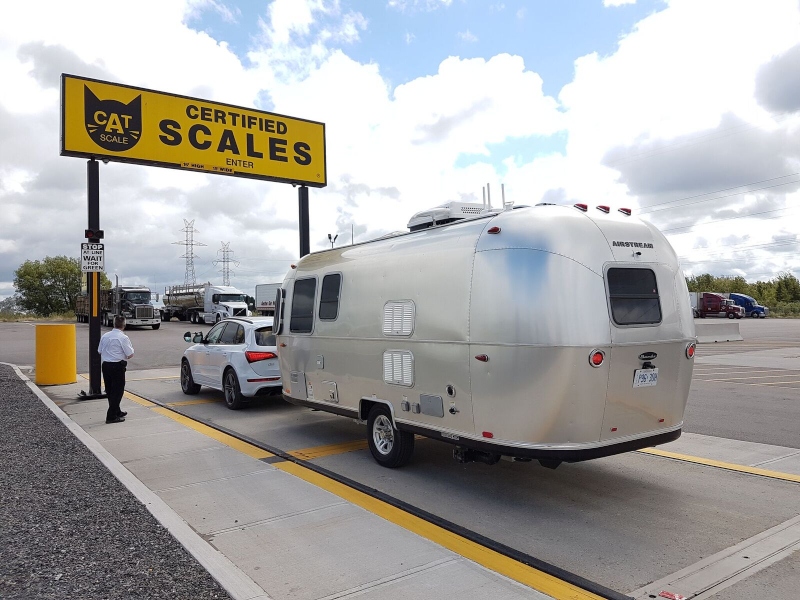
Another critical consideration when choosing between a single and double axle camper trailer is the cargo-carrying capacity.
If you’re planning on bringing large or heavy items on your camping trips, you’ll need a travel trailer with the ability to carry more weight. Here, a double axle camper trailer is the better option, as it can typically handle up to twice the weight of a single axle model.
However, it’s important to note that the cargo-carrying capacity of a double axle trailer can vary depending on the specific model and make. Therefore, be sure to check the manufacturer’s specifications before making a final decision.
3. Fuel Economy- Single Axle
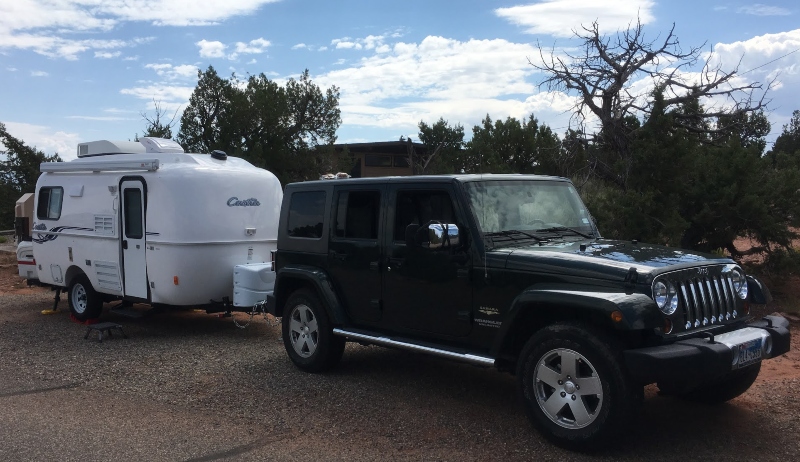
The three significant factors to consider are weight, aerodynamics, and overall design for fuel economy. Single axle trailers weigh less than their dual axle counterparts, making them more fuel-efficient.
For example, the single axle molded fiberglass camper is one of the most aerodynamic trailers. Its rounded front cap and fitted two-piece design reduce drag, making it more fuel-efficient than traditional trailers.
The molded fiberglass travel trailers like those from Casita or Scamp have other excellent characteristics that make them fuel-efficient campers. These trailers are much lighter than their conventional counterparts and can be towed by smaller vehicles, further improving fuel economy.
Of course, the single axle versions will give you those extra miles per gallon you want.
4. Function and Style- Double Axle
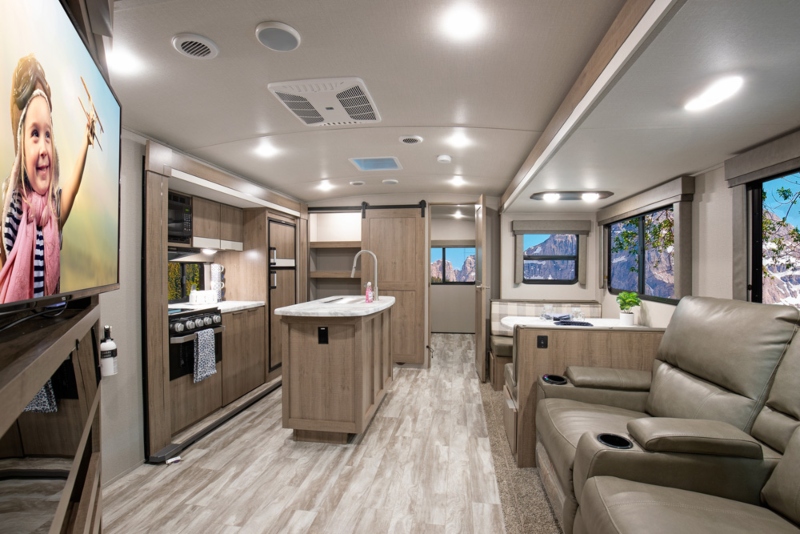
When shopping for a travel trailer, you’ll notice that many of the same floorplans are available in single and dual axle versions. So what’s the difference, and which one is right for you?
One key factor to consider is weight. Single axle travel trailers are limited to a relatively light GVW (Gross Vehicle Weight). As a result, they can’t accommodate certain heavy features like large toy hauler garages or fifth wheel-style layouts with residential furniture and appliances.
Dual axle RVs can handle the weight of these features, making them a better choice if you’re looking for a heavy hauler or residential comfort travel trailer.
5. Maintenance & Repair- TIE
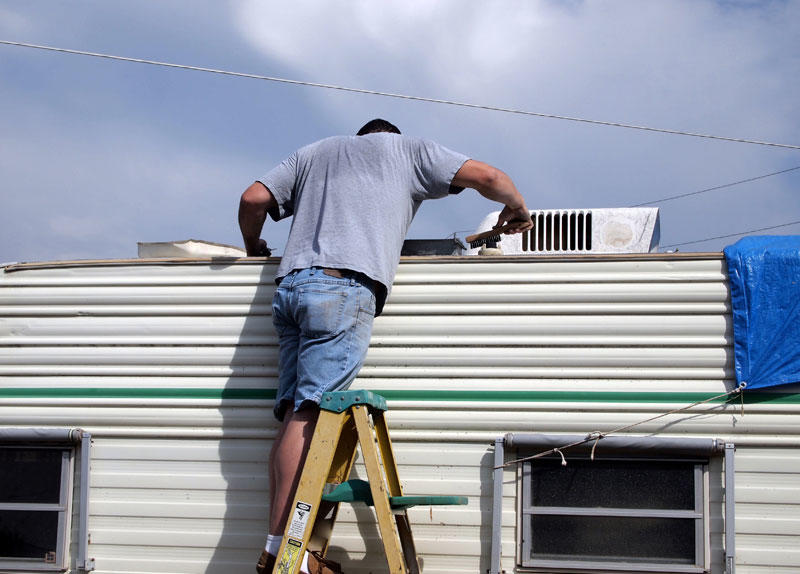
As anyone who has ever taken an RV out on the open road knows, maintenance is key to keeping things running smoothly. That’s why it’s essential to pay attention to all the different systems on your RV, including the axle.
One benefit of having a single axle travel trailer is that you don’t have to worry about maintaining and repairing two axles. However, having only one axle taking all the road punishment leads to a shorter component lifespan.
Double-axles spread the weight over four tires and two axles, which can lessen the wear and tear, but there’s twice as much to maintain. As a result, maintenance for single and double axles is about the same.
6. Maneuverability- Single Axle
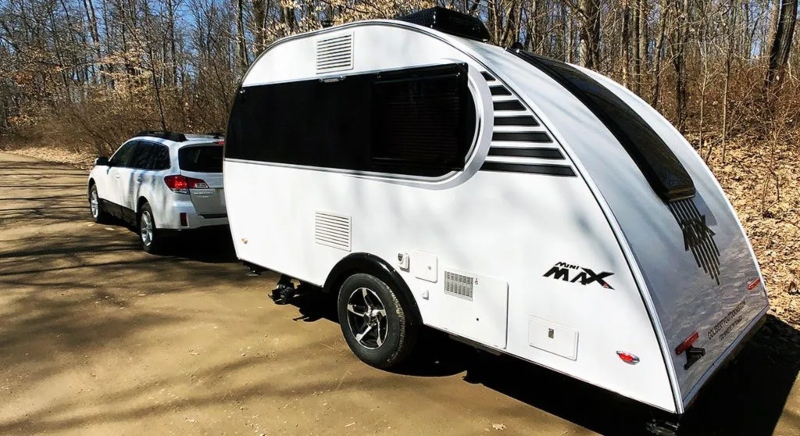
When you’re RVing, you never know what obstacles you’ll encounter on the road. That’s why it’s crucial to have a trailer that can maneuver around tight corners and rugged terrain.
Single axle trailers are particularly well-suited for this type of task. Thanks to their compact size, they can easily navigate around obstacles like trees, rocks, and utility poles.
7. Purchase Price- Single Axle
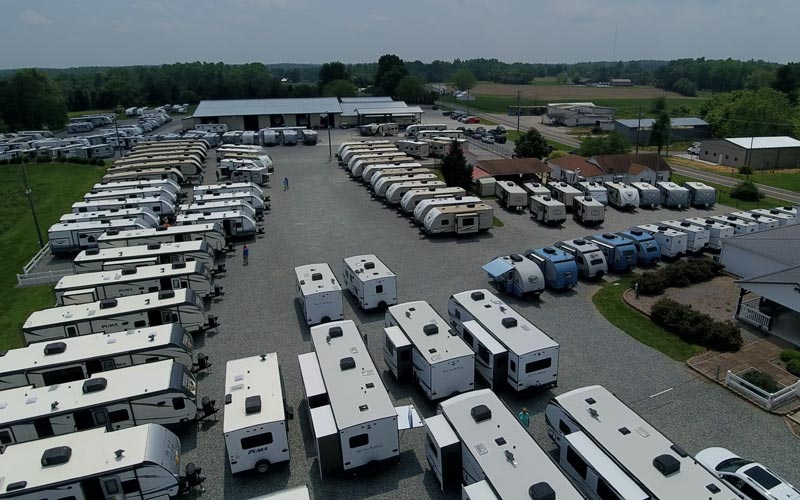
One of the most important considerations when shopping for an RV is the purchase price. Smaller single-axle RVs typically cost less than larger RVs with multiple axles.
For one, smaller RVs require less material to build, making them more cost-effective from a manufacturing standpoint. They also need less fuel and other resources, resulting in lower production costs and reduced operating expenses.
And because they have quality RV-style features and amenities (versus residential level), they’re less expensive to purchase.
8. Resale Value- Double Axle
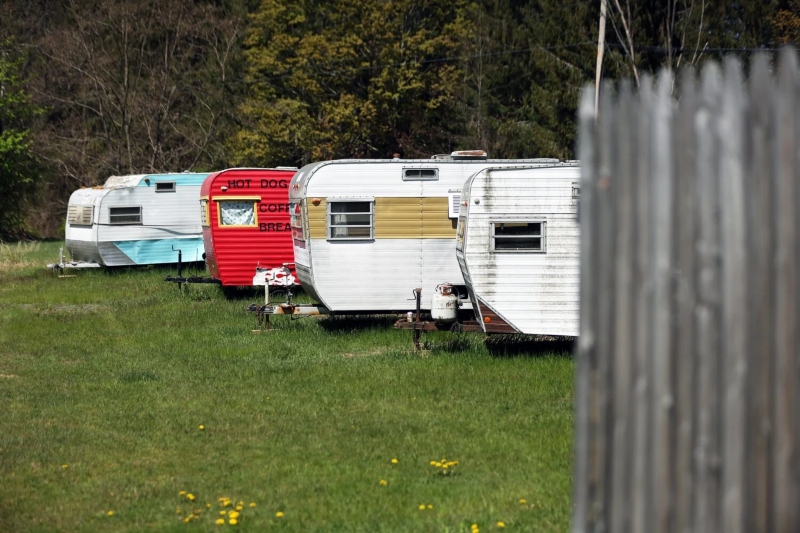
When shopping for a travel trailer, many people prioritize features and affordability. However, it’s also important to consider resale value.
Double axle trailers tend to hold their value better than single axle trailers due to upgraded features and higher starting price points. This is especially true for mid-level to luxury travel trailers.
If you plan to sell your trailer in the future, you’ll likely get a better return on investment with a double axle trailer.
9. RV Tires- TIE
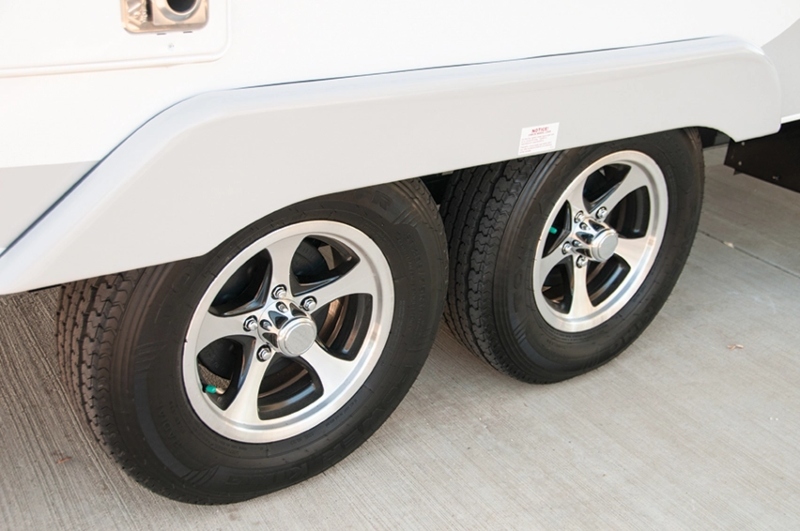
There’s no distinction between single and double axles when it comes to determining when to maintain, repair, and replace RV tires.
However, there are some key factors to keep in mind no matter what type of axle system you have.
Single axle tires are less expensive since you’re only replacing two tires. However, that lower cost is offset because single axle tires are more likely to wear out sooner from the weight and friction placed on one set of tires.
Also, it can be a disaster should one of your single axle RV tires blow out, leaving you stranded on the side of the road. Learn what you can do to avoid RV tire blowouts in our feature article.
Double axle tires are more stable since they have four tires on the ground. However, they’re also more expensive to replace, but you can often limp to safety during a blowout.
10. RV Lifestyle Diversity- Single Axle
A single axle travel trailer is the lighter of the two options for RV weight. In addition, because single axle RVs are designed to accommodate crossovers and mid-size SUVs, they offer more variety for RVers interested in off-roading.
Single axle camper trailer buyers can purchase a standard on-road version or choose the optional RV off-road package with a better suspension, bigger wheels, and other features.
SUV-friendly travel trailers are becoming increasingly popular. They offer the perfect blend of comfort, convenience, and RV lifestyle diversity that people desire while still being fuel-efficient and easy to maneuver.
11. Trailer Sway- Double Axle
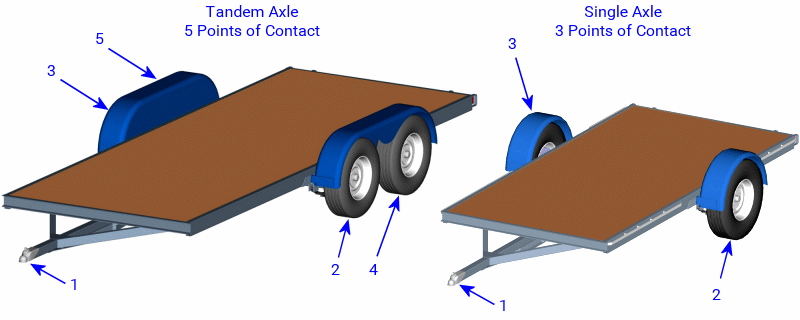
Trailer sway is one of the most dangerous conditions when towing a travel trailer. It happens when the trailer oscillates from side to side and can quickly become uncontrollable.
If you find yourself in this situation, the best thing to do is to slow down and try to regain control of the vehicle. However, if the trailer sway is severe, it can lead to a jackknife, which is when the trailer swings around and collides with the tow vehicle.
It’s essential to prevent trailer sway before it happens. All travel trailers have sway concerns, but a double-axle travel trailer generally is more stable when towing. To learn much more about preventing travel trailer sway check out our article called How To Stop Travel Trailer Sway.
A double-axle trailer has four wheels on the ground instead of two and consequently has a much broader footprint on the road. This added stability can help prevent trailer sway and keep you safe while towing.
12. Toy Haulers- Double Axle
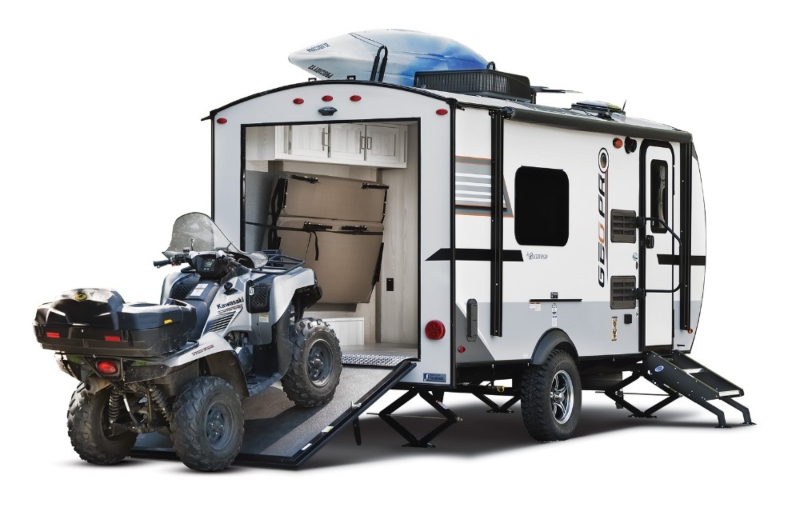
Unlike more traditional trailers, toy haulers are designed to hold and transport recreational vehicles such as ATVs and motorcycles. As a result, they need to be built tough to handle a lot of weight. That’s why most toy haulers are made with a double or triple axle.
But in the case of the KZ Escape Hatch models, which are toy haulers made with a single axle, their axle weight and GVWR of 4,000 lbs. allow for kayaks, bicycles, and other light adventure toys to be transported without issue.
Some single axle toy hauler travel trailers can take the weight of smaller ATVs or other lightweight motorized adventure toys.
If you decide that you want a single axle camper trailer, be mindful of the GVWR. We also recommend getting your RV weighed at a CAT Scale when it’s loaded up for safety purposes. Towing a travel trailer that’s overweight is illegal and dangerous.
Do All The Tires On A Trailer Have To Be The Same?
Trailer tires should ideally be the same size, brand, and model to ensure proper weight distribution and carrying capacity.
Manufacturers construct trailer tires differently from regular tires, incorporating specific differences in rubber consistency, sidewall strength, and internal construction.
Mismatched tires can create uneven weight distribution and imbalances, especially at higher speeds.
It can also cause uneven wear on the tires, potentially leading to blowouts.
Experts recommend using the same type of tires on all trailer wheels for optimal performance and safety.
Can You Tow A Dual Axle Trailer With One Blown Tire?
Towing a dual-axle trailer with one blown tire is possible but not recommended.
When one tire blows out, the remaining three bear more weight and strain. Uneven tire wear can occur, potentially leading to further blowouts or damage.
In addition, towing a trailer with an under-inflated or blown tire can strain the trailer’s axles, suspension, and frame.
Trailer strain can lead to costly repairs and possibly even damage your vehicle if overloaded.
Therefore, while it may be possible to tow a dual axle trailer with one blown tire, it is advisable to proceed cautiously and address the issue as soon as possible to ensure safety and prevent further damage.
Largest Single Axle Travel Trailer: Airstream Caravel 22FB
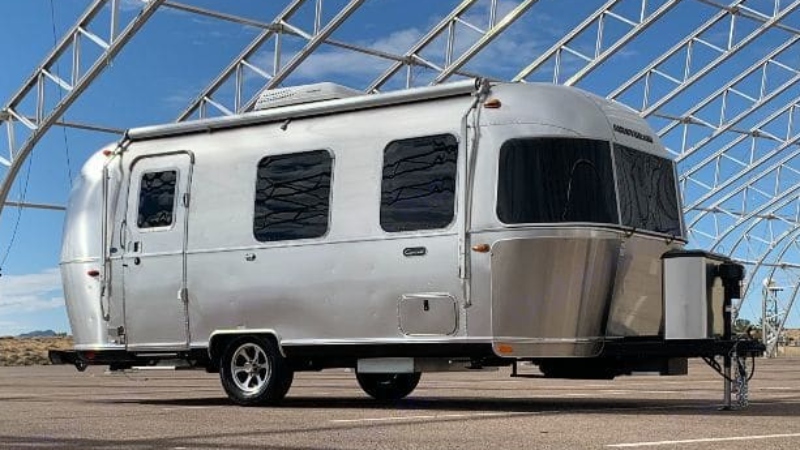
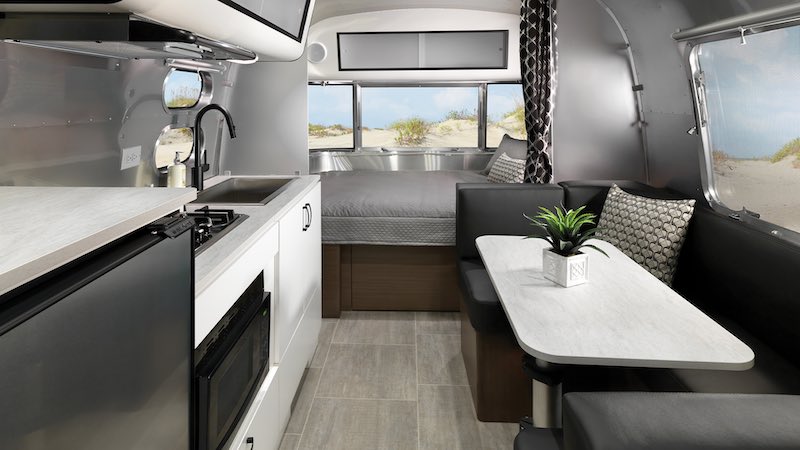
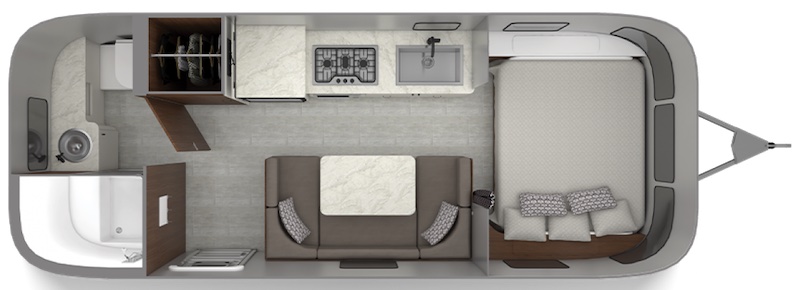
- UVW: 4,000 lbs.
- Tongue Weight: 525 lbs.
- Length: 22.2 ft.
- GVWR: 5,000 lbs.
- CCC: 1,000 lbs.
- Sleep: 2-4
Boasting a roomy floor plan and innovative design, the Airstream Caravel 22FB is the largest single axle travel trailer currently on the market. With its sleek and aerodynamic exterior profile, this advanced camper is ideal for any outdoor adventure, from relaxing road trips to rugged camping trips.
Featuring premium materials and state-of-the-art technology, this versatile RV offers all the comforts of home out in nature, from spacious living areas to plush sleeping quarters.
Constructed with a durable aluminum superstructure, the Caravel 22FB is built to withstand the elements while keeping you comfortable and safe. In addition, this Airstream travel trailer is expertly outfitted with high-quality appliances, including a flat-screen TV, stove, microwave, and refrigerator.
The integrated Airstream Smart Control Technology System provides simple control for many of the camper’s features, from the lighting to the temperature. You can even operate it on your smartphone.
Whether you’re a seasoned camper looking to upgrade or just starting out, the Airstream Caravel 22FB is the perfect travel trailer for any adventure.
Shortest Dual Axle Travel Trailer: Escape Trailer 19
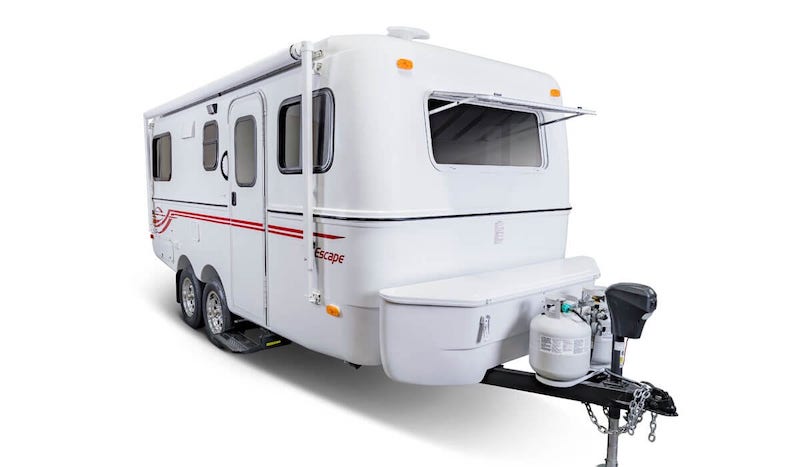
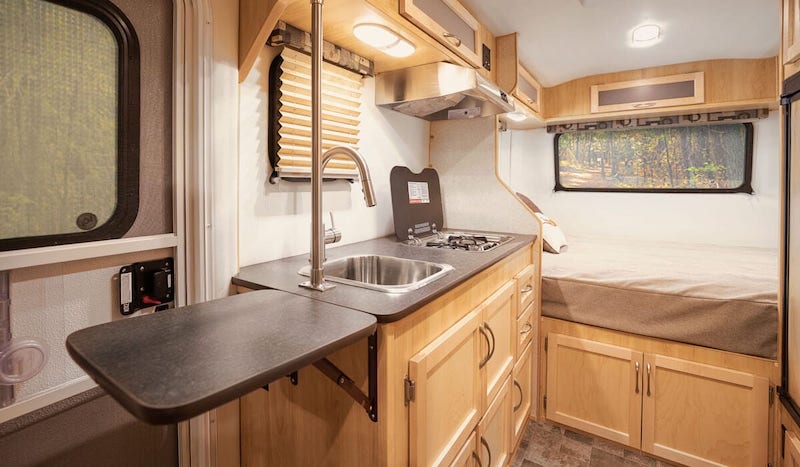
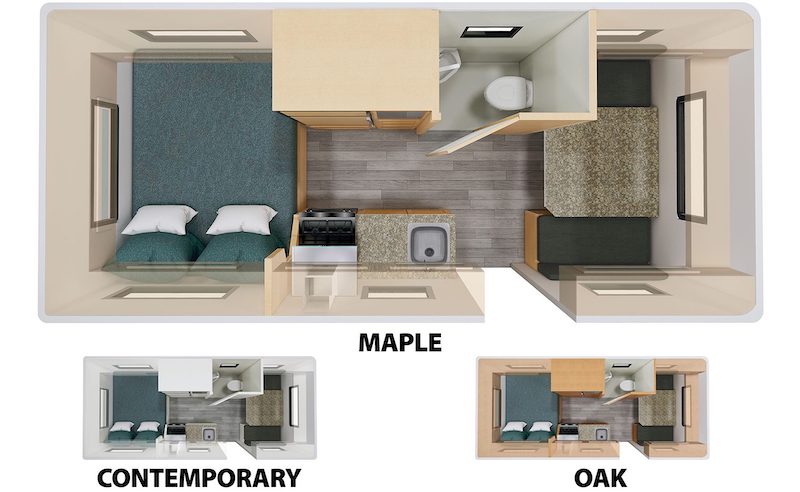
- UVW: 3,250 lbs.
- Tongue Weight: 306 lbs.
- Length: 19.6 ft.
- GVWR: 5,000 lbs.
- CCC: 1,750 lbs.
- Sleep: 2-4
If you’re looking for the shortest dual axle travel trailer on the market, you’ll want to check out the Escape Trailer 19. This compact RV is perfect for couples or small families who want to enjoy the great outdoors without towing a large trailer.
At just 19 feet long and with lightweight construction, most mid-size SUVs and pickup trucks can easily tow the Escape Trailer 19. And thanks to its dual axle design, it’s also very stable on the road.
Despite its compact size, the Escape Trailer 19 offers all the amenities you need for a comfortable journey, including a queen-size bed, kitchenette, and bathroom with a shower.
You can also choose an optional awning, air conditioning with a digital thermostat, and a 190W solar panel with a charge controller to further enhance your camping experience.
Final Thoughts on Single VS Double Axle Camper Trailers
So, what’s the verdict? Is a single axle or dual axle camper trailer better? Ultimately, the decision is up to you and your preferences.
As discussed here in our article, we found both types of axles have their pros and cons.
If you’re looking for a more maneuverable trailer that’s easy to tow, then a single axle trailer is probably the best option. However, if you’re willing to sacrifice some maneuverability for a more stable trailer with residential-level features, a double axle trailer may be best.
The bottom line is that no matter which type of axle you select, you’re sure to have a great time out on the open road.
1. How To Stop Travel Trailer Sway
2. Travel Trailer Turning Radius Tips
3. Which RV is the Easiest to Drive?
4. 20 Best Ways to Reduce RV Weight
5. 20 Best Campers to Tow With an SUV
Mike Scarpignato – Bio
Mike Scarpignato created RVBlogger.com over five years ago in 2018 to share all we have learned about RV camping.
Mike is an avid outdoorsman with decades of experience tent camping and traveling in his 2008 Gulf Stream Conquest Class C RV and 2021 Thor Challenger Class A motorhome.
We attend RV Shows and visit RV dealerships all across the country to tour and review drivable motorhomes and towable trailers to provide the best evaluations of these RVs in our blog articles and YouTube videos.
We are 3/4-time RVers who created RVBlogger.com to provide helpful information about all kinds of RVs and related products, gear, camping memberships, tips, hacks and advice.



Northwood makes an 18 ft Nash that has dual axles. Nash 18FM. It pulls really nice!
Thanks for the info Frank!!! We will check one out!
Mike